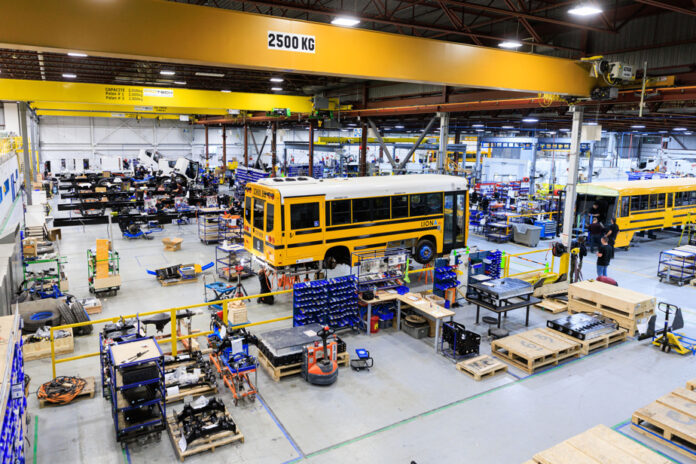Nearly half of Lion Electric’s order book is at risk because of Ottawa’s slowness in processing subsidy requests, warns the manufacturer of electric trucks and buses. Infrastructure Canada’s Zero-Emission Public Transportation Fund (FTCZE) is a real “administrative burden,” says the Quebec company.
This warning appears in the financial report of the company based in Saint-Jérôme released Tuesday on the occasion of the publication of the results for the third quarter which ended on September 30. If these delays “persist”, orders could be canceled “in whole or in part, or be subject to renegotiation”, it is explained.
The 2,232 vehicles – 1,964 buses and 268 trucks – found in Lion Electric’s order book represented a value of 525 million as of November 6.
“Each approval is different,” said the manufacturer’s CEO, Marc Bédard, in a conference call with analysts. Orders are largest for school buses. We are talking with the federal government and our customers and we hope to find a solution. It is an administrative burden. »
The founder of Lion once things will accelerate once the “first big files” get the green light from the Trudeau government.
With its envelope of 2.75 billion, the FTCZE aims to accelerate electrification among public transport and school bus operators. Several of the announcements made by Lion regarding school bus orders in Canada noted that the contract was generally conditional on obtaining grants from the Fund.
As recently as November 3, we found this mention in the context of a contract for 50 LionC models won by the Quebec company from Highland Electric Fleets for school buses which must circulate in Alberta.
Despite a quarterly performance described as mixed by some financial analysts, investors reacted favorably to the quarterly performance of Lion Électrique. As of Tuesday morning on the Toronto Stock Exchange, the stock was up 8%, or 19 cents, to trade at $2.57. Year to date, the stock is down about 12%.
During the months of July, August and September, the bus and truck manufacturer almost doubled its sales in addition to posting a “record” gross margin (see table). However, it remained in the red.
Lion delivered 245 vehicles during the quarter, but most analysts were expecting 305 deliveries. Since August 3, the order book has contracted by 327 units. This is partly due to the withdrawal of an order for 140 Lion A school buses – a model whose production was delayed. A similar decision was made for the Lion M minibus.
“We decided to focus on commercial production of products in demand,” Bédard told analysts.
Another product will take longer than expected to leave the factory. This is the Lion 8T, a 10-wheel tractor. This delay is attributable to a legal dispute with Nikola Motors. This will force the Saint-Jérôme company to produce the Lion 8T battery, which was not the initial plan. Production of this truck has therefore been postponed until next year.
Benoit Poirier of Desjardins Securities believes that Lion still has work to do to convince investors.
“We consider these results to be slightly negative given the decrease in order backlog, as this constitutes, in our opinion, a key indicator for the stock,” the analyst wrote in a note. Some investors may wait for an improvement in this area before committing. »
At National Bank Financial, Ruper Merer also noticed the decline in the order book. On a more positive note, the analyst believes that the production plants in Mirabel and Joliet (United States) should allow the manufacturer to continue to increase its deliveries.
Mr. Merer also believes that the investment phase is about to end at Lion, which has also kicked off its battery factory in Mirabel, in the Laurentians. With 132 million in available liquidity, the company is in an “adequate” position in this regard, the analyst believes.















